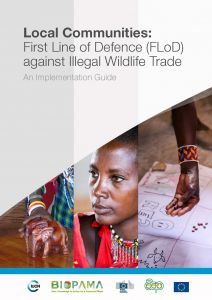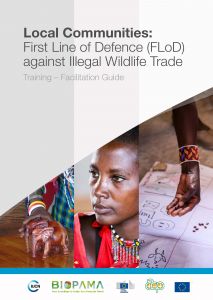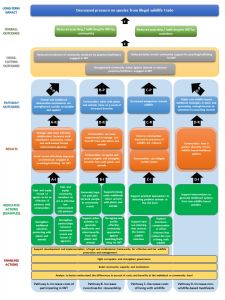The role of local communities in combating illegal wildlife trade is being increasingly recognised as central to effective anti-poaching strategies. While this is enshrined in a number of recent global policy statements and commitments, little guidance is available on how to effectively engage communities in practice. “Local Communities: First Line of Defense against Illegal Wildlife Trade (FloD)” aims to help address this gap. Developed by IIED, IUCN,IUCN CEESP/SSC Sustainable Use and Livelihoods Specialist Group, and the IUCN/SSC African Elephant Specialist Group, the initiative is a multi-stakeholder action research approach designed for use by an independent team of local stakeholders and project designers or implementers working with communities. Since the launch of the first edition of the guidance in 2018, several pilots have been conducted and the guidance further developed and focussed. In 2021, BIOPAMA, with the Southern African Wildlife College, supported a revision of the guidance and the development a Training Manual for the use of FLoD. These resources are open access and available for anyone to use.
TAGS:
Related News
-
- Assessment tools & their application
- IMET
- SAGE
Strengthening Protected Area Management and Governance in Eastern and Southern Africa Regions through Governance and Management Effectiveness tools
-
- Action component
- Assessment tools & their application
- Capacity Development
- Observatories
New Publication: Exploring the impact of grants in Eastern and Southern Africa
-
- Action component
- Data and information
- Observatories
- Planning and decision support
Results and lessons learned from grant implementation
-
- Assessment tools & their application
- Observatories
The Network of Coaches for effective management of protected areas launched
-
- Planning and decision support
From knowledge to action: Two studies on protected areas are discussed in support of the implementation of the COMIFAC Convergence Plan
-
- Assessment tools & their application
Integrated Management Effectiveness Tool: Release of IMET 2.2
-
- Assessment tools & their application
Two New Open Consultancies: Copy-editor and Designer (Deadline 30 June 2021)
-
- Data and information
- Observatories
Data inventorying exercise to support the Intergovernmental Authority on Development
-
- Assessment tools & their application
- Observatories
Atelier de recyclage des coaches sur l’outil IMET
-
- Assessment tools & their application
- Capacity Development
- Data and information
- Observatories
Meet Christine Mentzel, BIOPAMA coordinator for Eastern and Southern Africa
-
- Observatories
- Planning and decision support
Sustainable finance and funding of protected areas in the Caribbean: a conversation
-
- Planning and decision support
Protected areas need better and more diversified funding, says new IUCN study
-
- Planning and decision support
IUCN report shines light on Africa’s natural wonders and identifies potential new World Heritage sites
-
- Assessment tools & their application
- Capacity Development
Saint Lucia equipped with a protected area management effectiveness (PAME) assessment tool
-
- Assessment tools & their application
- Capacity Development
Improve management effectiveness of protected areas – a way forward to achieve conservation goals
-
- Observatories
- Planning and decision support
Pacific Regional Resource Hub making an impact: 50% of protected areas data updated
-
- Assessment tools & their application
- Capacity Development
Capacity development on the IMET tool
-
- Assessment tools & their application
- Capacity Development
Tools for improving protected areas management and governance: the IUCN Green List
-
- Planning and decision support
Consultancy opportunity: Design of the BIOPAMA African Natural Heritage Review
-
- Observatories
- Planning and decision support
Understanding tools for protected area management, governance and social impacts

next

prev
This website uses cookies so that we can provide you with the best user experience possible. Cookie information is stored in your browser and performs functions such as recognising you when you return to our website and helping our team to understand which sections of the website you find most interesting and useful.
Strictly Necessary Cookie should be enabled at all times so that we can save your preferences for cookie settings.
If you disable this cookie, we will not be able to save your preferences. This means that every time you visit this website you will need to enable or disable cookies again.







